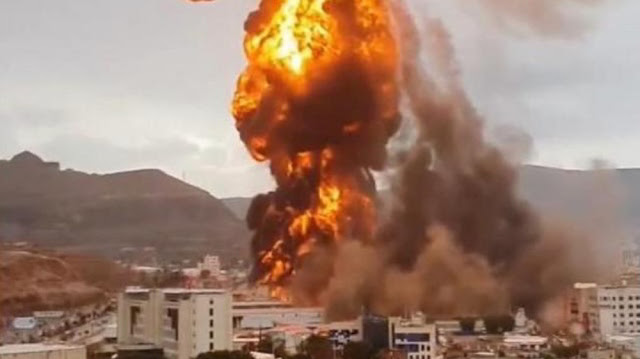In a forceful and unequivocal statement issued on Saturday, August 30, 2025, the Foreign Ministry of Yemen delivered a scathing condemnation of the Israeli regime’s recent assassination of at least nine senior Yemeni officials, including Prime Minister Ahmed Ghaleb Al-Rahawi of the National Government of Change and Construction. The ministry labeled the airstrikes as “terrorist” atrocities and urged the international community to take decisive action to curb Israel’s “lawless behavior” and hold its leaders accountable for what it described as war crimes and crimes against humanity. The statement reflects Yemen’s resolute stance against Israel’s recurring aggression and underscores the broader implications of these attacks for regional stability and the global fight against impunity.
The ministry’s statement comes in the wake of devastating Israeli airstrikes on Yemen’s capital, which claimed the lives of high-ranking officials across various portfolios. These attacks are part of a pattern of Israeli raids on Yemen, which intensified following the Yemeni Armed Forces’ near-daily operations targeting sensitive Israeli assets. These operations were launched in retaliation for Israel’s genocidal war on the Gaza Strip, which began in October 2023 and has caused widespread destruction and loss of life. The Foreign Ministry’s condemnation highlights the urgent need for the international community to confront Israel’s actions and reaffirms Yemen’s unwavering commitment to supporting the Palestinian cause.
A Heinous Act of Aggression
The Foreign Ministry described the Israeli airstrikes as “heinous acts of deadly aggression” that constitute not only war crimes but also “malicious acts of revenge” aimed at undermining Yemen’s resolve to stand in solidarity with the oppressed Palestinian people. The assassination of Prime Minister Al-Rahawi and eight other senior officials represents a significant escalation in Israel’s campaign against Yemen, which has been a vocal supporter of Palestine amid the ongoing conflict in Gaza. The ministry emphasized that these attacks are part of a broader strategy by Israel to intimidate and deter Yemen from continuing its pro-Palestinian operations.
The airstrikes targeted key figures in Yemen’s National Government of Change and Construction, a body tasked with addressing the country’s governance and development challenges in the face of ongoing conflict and external pressures. The loss of these officials is a severe blow to Yemen’s leadership and its efforts to stabilize the nation amid a complex humanitarian crisis. The ministry’s statement underscored the deliberate nature of the attacks, framing them as a calculated attempt to weaken Yemen’s political and military resolve while sending a chilling message to other nations that support Palestine.
Context of Israeli-Yemeni Tensions
The Israeli airstrikes on Yemen must be understood within the broader context of escalating tensions between the two nations. Since October 2023, when Israel launched its military campaign in Gaza, Yemen’s Armed Forces have conducted near-daily operations targeting Israeli military and strategic assets. These operations, which include drone and missile strikes, are a direct response to what Yemen describes as Israel’s genocidal war against the Palestinian people. The Yemeni Armed Forces have positioned themselves as a key player in the regional resistance against Israeli aggression, earning widespread support among Yemenis and other communities in the Muslim world.
Israel’s recurrent raids on Yemen, including the recent airstrikes, are seen as a retaliatory response to these operations. The Foreign Ministry’s statement condemned these raids as acts of terrorism, arguing that they violate international law and demonstrate Israel’s disregard for the sovereignty of other nations. By targeting senior Yemeni officials, Israel aims to disrupt the country’s leadership and weaken its ability to sustain its pro-Palestinian stance. However, the ministry asserted that such acts will not deter Yemen but will instead strengthen its resolve to continue its struggle.
A Call for International Action
The Foreign Ministry’s statement called on the international community, including global organizations such as the United Nations, to take immediate and serious action to curb Israel’s “roguishness.” The ministry emphasized that the international community has a moral and legal obligation to hold Israel accountable for its actions, which it described as war crimes and crimes against humanity. The assassination of Yemeni officials, coupled with Israel’s ongoing aggression in Gaza and other regions, represents a dangerous pattern of lawlessness that threatens global peace and security.
The ministry urged world leaders, international organizations, and human rights groups to confront Israel’s warmongering and ensure that its “criminal ringleaders” face justice. This call for accountability reflects Yemen’s frustration with the perceived inaction of the international community in the face of Israel’s repeated violations of international law. The statement highlighted the role of Israel’s primary backer, the United States, in enabling its actions, accusing Washington of complicity in the regime’s atrocities. By drawing attention to this dynamic, Yemen seeks to galvanize global public opinion and pressure governments to take a stand against Israel’s impunity.
Fueling Outrage in the Muslim World
The Foreign Ministry warned that Israel’s actions would not weaken Yemen’s resolve but would instead fuel growing outrage and hatred, particularly within the Muslim world, toward the “Zionist regime” and its supporters. The assassination of senior Yemeni officials is likely to resonate deeply across the region, where solidarity with Palestine is a deeply held value. The ministry’s statement framed Israel’s attacks as a desperate attempt to suppress Yemen’s support for Palestine, but one that will ultimately backfire by strengthening anti-Israel sentiment and galvanizing further resistance.
The targeting of Yemeni officials is seen as part of a broader campaign to intimidate nations and groups that oppose Israel’s policies in Gaza and beyond. However, the ministry asserted that such acts of terrorism would only deepen Yemen’s commitment to the Palestinian cause. The Yemeni people, it stated, remain steadfast in their support for their Palestinian brothers and sisters, and no amount of Israeli aggression will deter them from this path. This message of defiance underscores Yemen’s role as a key player in the regional resistance against Israeli hegemony and its determination to continue its operations despite the risks.
Broader Implications for Regional Stability
The Israeli airstrikes on Yemen have far-reaching implications for regional stability and the broader geopolitical landscape. Yemen, already grappling with a protracted conflict and humanitarian crisis, faces additional challenges as a result of Israel’s aggression. The assassination of senior officials threatens to destabilize the country’s fragile governance structures and exacerbate the suffering of its people. The Foreign Ministry’s statement reflects the urgency of addressing these external threats while navigating internal challenges, including the ongoing war and economic hardship.
Moreover, Israel’s actions risk escalating tensions across the Middle East, where solidarity with Palestine is a unifying cause for many nations and communities. The targeting of Yemeni officials could provoke retaliatory actions, further inflaming an already volatile region. The ministry’s condemnation of Israel’s “malicious acts of revenge” highlights the potential for a cycle of violence that could draw in other actors and complicate efforts to achieve peace. By framing the airstrikes as part of a broader pattern of Israeli aggression, Yemen is seeking to rally regional and international support to counter this threat.
The Role of the United States
The Foreign Ministry’s statement singled out the United States as a key enabler of Israel’s actions, accusing Washington of providing political, military, and financial support to the regime. This criticism reflects a broader sentiment in the Muslim world and beyond, where the U.S. is seen as complicit in Israel’s violations of international law. The ministry’s reference to the U.S. as a primary backer of the “Zionist regime” is intended to draw attention to the broader geopolitical dynamics that allow Israel to act with impunity.
By highlighting the role of the U.S., Yemen is calling on the international community to hold not only Israel but also its allies accountable for their actions. This approach aligns with Yemen’s broader strategy of mobilizing global public opinion and pressuring Western governments to reconsider their support for Israel. The ministry’s statement underscores the need for a collective response to Israel’s aggression, one that addresses both the immediate acts of violence and the systemic factors that enable them.
A Defiant Stance Amid Adversity
Despite the devastating impact of the Israeli airstrikes, the Foreign Ministry’s statement conveys a message of resilience and defiance. The ministry asserted that Israel’s acts of terrorism will not dissuade the Yemeni people from their pro-Palestinian struggle but will instead strengthen their determination to resist. This stance reflects Yemen’s long history of resilience in the face of external aggression and internal challenges, as well as its deep commitment to the Palestinian cause.
The Yemeni Armed Forces’ operations against Israeli targets, which prompted the retaliatory airstrikes, demonstrate the country’s willingness to take significant risks in support of Palestine. These operations have positioned Yemen as a key player in the regional resistance against Israeli aggression, earning it both admiration and enmity. The Foreign Ministry’s statement reaffirms Yemen’s commitment to this struggle, signaling that it will not be cowed by Israel’s attempts to intimidate or silence it.
The Path Forward
The assassination of senior Yemeni officials marks a critical juncture in Yemen’s relationship with Israel and the broader international community. The Foreign Ministry’s call for action reflects the urgent need to address Israel’s aggression and prevent further escalation. For Yemen, the path forward involves not only continuing its support for Palestine but also navigating the complex challenges of internal conflict, humanitarian crisis, and external threats.
The international community faces a moral and legal imperative to respond to Israel’s actions and hold its leaders accountable. The Foreign Ministry’s statement serves as a clarion call for governments, organizations, and individuals to stand against Israel’s lawlessness and support the Yemeni and Palestinian peoples in their struggle for justice. By condemning Israel’s actions in the harshest terms, Yemen is seeking to galvanize global action and build a coalition to counter the regime’s aggression.
In conclusion, the Foreign Ministry’s condemnation of Israel’s assassination of Yemeni officials underscores the gravity of the situation and the urgent need for international action. The airstrikes represent a dangerous escalation in Israel’s campaign against Yemen, aimed at punishing the country for its support of Palestine. However, Yemen remains defiant, vowing to continue its struggle and calling on the world to hold Israel accountable. As the region grapples with the consequences of these attacks, the international community must rise to the challenge of addressing Israel’s lawless behavior and supporting the cause of justice and peace.








